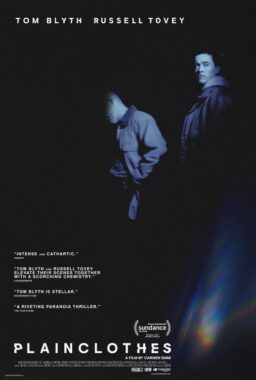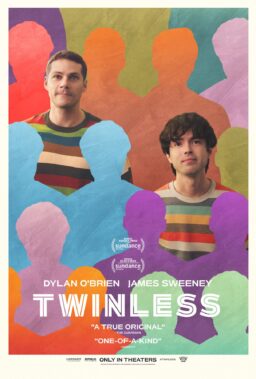In 2013, Matt Johnson’s “The Dirties” was chosen as one of the films in the first Chicago Critics Film Festival, an event put on by the Chicago Film Critics Association. Johnson returned to Chicago in 2023 for the opening night of the 10th-anniversary edition of the fest, leading a raucous and fascinating Q&A that even included a trivia portion with Criterion DVDs as prizes. Johnson played down his brilliance in the introduction, joking about how he likes to come off silly so people are surprised that he made a film as smart as “BlackBerry,” which is being released by IFC starting this Friday, May 12th. Of course, it’s a bit of a joke because Johnson is clearly a smart filmmaker, one who’s interested in the way people interact with not only themselves but history.
His latest film is his most impressive to date, the story of the tempestuous rise and fall of the BlackBerry personal device, the machine that really set everything in motion that would lead to the worldwide tech addiction we all have regarding the mini-computers we carry everywhere we go. Starring Jay Baruchel, Glenn Howerton, and Johnson himself (along with a parade of great character actors like Michael Ironside, Saul Rubinek, and Cary Elwes), “BlackBerry” is an intelligent movie about an untold chapter in tech history. I sat with Johnson during the opening night screening to pick his brain on why it works and how we got here.
This film has already traveled to a lot of festivals in 2023, including Berlinale, SXSW, and here. Talk a bit about the importance of festivals for this movie, and in general.
When I was very young, I realized that festivals were everything. I don’t think the general public truly understands how the film festival circuit and the film festival culture is more or less responsible for 90% of the independent films that they get to see and the filmmakers and those careers that wind up being commercial. I teach film at the University of Toronto, and to say that you are gonna have a film career as a director or really any key above-the-line role without a film festival, I think is almost suicide. I think that young people, if they’re thinking of becoming filmmakers, need to look at film festivals and start thinking about what one is in their voice. I have a friend named Kazik Radwanski who’s made a number of films, most recently “Anne at 13,000 Ft.,” and right away, he was playing his shorts at Berlin. And he began a relationship with Berlin. It’s almost as though the festival winds up contributing to your voice. They have a programming language. They have an aesthetic among programmers. You follow what they’re following. It becomes a bit of a feedback loop.
Personally, I owe my whole career to festivals. If “The Dirties” hadn’t done as well as it did, I never would have gone anywhere. And it’s festivals you wouldn’t think. I won Best Film at Fantastic Fest in Austin, and that winds up opening all of the genre festivals in the Europe, which I never would have been invited to. So then I’m playing at Sitges. And I’m meeting all of these Europeans for the first time. And then, I have a parallel experience at Locarno. That unlocks all of these other festivals. It was a true film education for a young person.

Is it arguable that they’re more important now? I worry about movies like this being able to get to an audience in the era of so much streaming noise and so much “content” control. How do you get films like this to people? I’m worried this won’t get made in ten years because it will all be a content farm.
Yeah. I hope it’s not that way. It seems like, in a way, you’re almost invoking the imprimatur that festivals put on movies like “Blackberry” that give the public license to then see them.
Well, this whole festival exists for word-of-mouth of movies we like. There’s nothing else. That feels more important now than it did ten years ago because it’s so hard to rise above the noise.
You’re absolutely right. But you know, the rise of Letterboxd shows us that there is a growing cinephile audience that is getting younger and younger. I think that audiences are always finding ways to stand out, to have niche tastes. While the internet does level everything, it does also create niche groups. It creates clubs. Discord, Tumblr, and even Reddit, in a broader sense, show us that people are looking to find very specific, very exclusive cliques. I think that cinema is benefitting from that. Now you’ve got people being like, “I love Rohmer, and this is my little Rohmer Club.” It’s cool to like them with these people, and you can help create an identity. If you’re growing up in the ‘80s and you’re watching movies in the cinema exclusively or on television, audiences are not responding and seeking these films out in the same way they are now. They’re being more active. It’s become a part of people’s personal branding. People’s Letterboxd are carving out an identity for themselves using their cinematic tastes. And that is new.
It is, but how do we convince the people who put up the money to make the movies that that’s a valuable audience?
Yeah. Again, people need to vote with their feet. Spending money on festivals like this and going to see movies in theaters like this helps. We’re also dealing with the fact that this next generation is almost agoraphobic in keeping away from public spaces in some ways. Just getting out to a theater is getting harder. But, again, I think the secret is just making cultural hot spots—places where you can go to meet people where something is happening.

At SXSW, there was this, “Tetris,” “Air”—what’s in the atmosphere right now?
It is so interesting. There was also that pinball movie. And you look to television, and within the last two years, you’ve had Uber, Theranos, WeWork. It seems as though, all of a sudden, it’s like we’re experiencing the new dot com. Do you remember “Startup.com” about 1999? Big influence on “BlackBerry.” We stole a lot of stuff from it. At that time around the dot com crash, filmmakers were rushing to cover it in a similar rise-and-fall way. But that was based on a disaster of what had happened.
Here, we’re dealing with documentaries and docudramas around things that are kind of in our everyday life. People are using Uber every day. I don’t think it’s as cynical as producers or people with money looking to put money behind a built-in audience and IP. That’s got to be some of it, but I think that we are in a moment when we are really wrestling with and trying to understand how we got here. How did we get here? It’s very difficult to make fiction movies that are dealing with the question of modernity in that way where it’s like … even “The Social Network” wasn’t really about the impact of Facebook.
So now we’re here in 2023 being like, “The world has changed so much, so quickly, where are the films and stories to help us understand what we’re supposed to do?” That’s what cinema and stories have done forever. They help teach us who we are. I love that Bjork quote when she says, “My job as an artist is to connect the myths of my past with the future.” We haven’t had a lot of that dealing with the present moment. This is a clumsy way of attempting to figure that out.
Through tech, largely, which is an interesting aspect. We’ve tried to figure out how we got here via mythology or humanity, but now it’s a tech examination.
Yeah, but to me, and I can only speak for my own experience, I think that it’s all the same. I look at “BlackBerry,” and I look at these guys, and I’m trying to extract the myth from it. I didn’t know anything about the BlackBerry. I didn’t even touch one before the movie. I’m not a technophile whatsoever. Didn’t touch one until I got to set. And what I thought was cool was, “Here are three guys who don’t realize they’re gonna change the world.” I think that their story might be useful to people long after we are no longer using smartphones. To me, this was not a story about three people who made a phone. That’s a documentary.

You just said all of these movies are about how we got here. So what does this film say about that journey?
I’m hoping that people can see just how accidental all of this really was. I think Mike Lazaridis and Doug Fregin had 20/20 vision but only six feet in front of their face. Right? They had no idea what the impact of this was gonna be. I look at what they did, and the culture of that company, and I feel like I’m watching a bunch of hackers. These guys are almost pranksters, in a way. The way that they’re dealing with technology or trying to solve problems. I don’t think that they cared about the implications of this product on a larger level.
And that puts the onus on how we use these devices on us. It makes us consider the product on our own because it doesn’t have an intention. “Here’s the product; we don’t even know what you’re supposed to do with it.” Our culture needs to realize that we need to decide how we’re using these devices and not think they were given to us for a specific reason to be used in a specific way. And the people I see who are the happiest in terms of using smart technology or social media are the ones who are very, very specific about it. They’re not letting technology rule them. It’s a very small piece of the puzzle, but one of the things that fascinated me about this story was just how clueless and visionless these three guys were about what they were doing. And I think that if you watch this movie and you laugh at these guys and go, “Oh, these guys aren’t really that special, and yet they are solely responsible for the smartphone culture that we live in right now.” There’s something to that.
It humanizes it. It makes it relatable in a way that shatters the myths around it.
Yeah. And, hopefully, it lets you realize that you can take control of this thing. I can use this phone however I want because it didn’t come from the hand of God.
“BlackBerry” opens in theaters on May 12th. The Chicago Critics Film Festival continues through May 11th.












